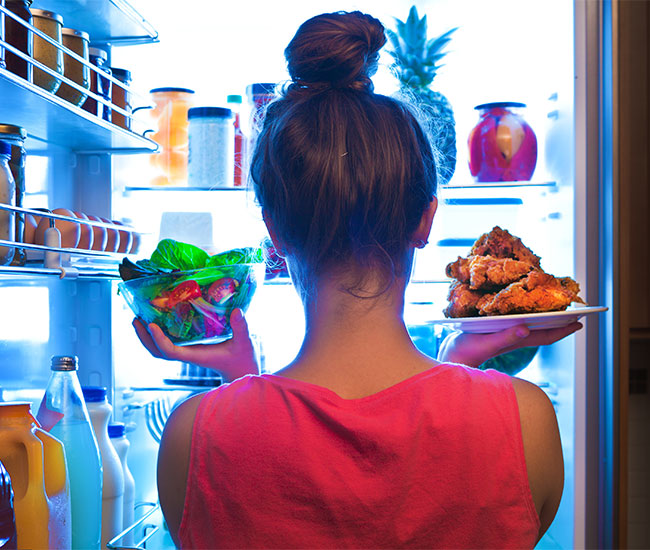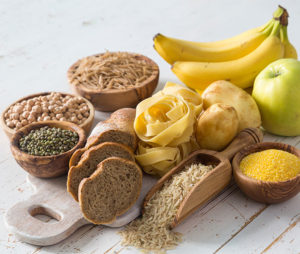

Are you sure you know how to best preserve the food you have at home? A very common error, for example, is keeping certain foods in the fridge that should be kept in the cupboard. Coffee, eggs, bananas, garlic, and tomatoes are all foods that you can keep in tubs and jars on your kitchen shelves. Learning to better manage how you store food in your kitchen will help you to avoid overloading your fridge, keeping it less full, cleaner, and more functional!
We have all wondered why eggs are kept on the shelves in the supermarket, but at home, we automatically put them in the fridge. Eggs can also be kept in just a basket or a box. It may even be inadvisable to keep your eggs in their designated area in the fridge because since this is usually in the door, every time the fridge is opened they will be subjected to fluctuations in temperature. Pastry recipes also tend to advise using eggs at room temperature.
Many people keep their coffee in the fridge, convinced that the low temperatures will keep the aromas of this delicious drink intact. But this is not correct: the humidity and odours in the fridge affect the organoleptic properties of coffee! The best place to store coffee (whether it is ground or in whole beans) is in a hermetically sealed jar in a cool, dark, dry place: for example, the good old kitchen cupboard, ideally a long way from the oven.
SEE ALSO: Extractor hoods: how to make them sparkling clean in a few, simple steps!
One of the most common questions about how to store food is about bananas: is it true that they should never be put in the fridge? The answer isn’t what you think. In the fridge, bananas go black faster, because the cold accelerates the ageing process of the peel and doesn’t allow them to ripen properly. It is better to keep them at room temperature, in a bunch, in a cool part of the kitchen.
Potatoes should never be kept in the fridge. The low temperatures encourage the formation of solanine, a substance that is present in these tubers and not particularly good for us. So how should we store potatoes? In a basket, wrapped in a cloth (they should stay in the dark).
SEE ALSO: The rubbish bin: 5 tips to keep it clean and free of bad smells!
Are you one of those people who put your tomatoes in the fridge as soon as you get home from the shops? You shouldn’t! Tomatoes keep very well in a shallow bowl at room temperature. The cold blocks the natural ripening process of these vegetables and makes their flesh floury and tasteless.
The avocados for sale in Italian supermarkets are (almost always) very hard. When you bring them home, don’t put them in the fridge, because the cold will make them ripen more slowly. Store your avocados in the fruit bowl, at room temperature, and you will be able to enjoy them after only two days. This rule for storing unripe fruit and vegetables also applies to many other types, such as kiwis and apricots.
The tendency to store chocolate in the fridge so that it doesn’t melt is quite common, especially in the summer. But this couldn’t be more ill-advised, because low temperatures are not good for the particular composition of this product, which tends to lose its flavour in the fridge. Store your chocolate in the coolest part of the kitchen, in the dark, well wrapped in its packaging, and you will see that it doesn’t melt.
Never put bread in the fridge! The cold and the humidity ruin the dough, so the bread will dry out and lose its crispness more quickly if it is kept in the fridge. This rule about bread is one of the food storage rules that has been the same since the dawn of time: keep your bread at room temperature, away from light, in a cotton sack!
Like all foods that don’t have a particularly high water content, onions can also be stored out of the fridge. You can put them in a basket or a ceramic container, far from potatoes and heat sources. Put them in the fridge only after they are open: store them in a glass jar with a lid, and you will see that they keep for a long time even if they have been cut. In general, it is always better to store strong-smelling food in well-sealed containers.
One of the most important rules for correct food storage is the diktat on honey, which should never be put in the fridge. Leave it in its jar and put it in the cupboard. Indeed, the cold can alter the characteristics of this food, as can light and heat. Honey contains natural preservatives, however, so it can manage pretty well on its own!
If reading this advice has made you feel like emptying your fridge, take advantage of the occasion and give it a good clean! You don’t need to use who knows how many products, just a rinse-free detergent like Mister Magic® Fridge and Microwave Cleaner, an antibacterial degreaser made with vinegar that prevents mould and condensation. With the same product, you can also clean the microwave.
